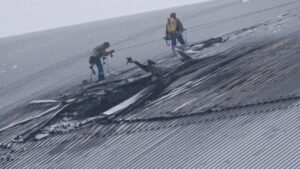A 71-year-old man with underlying virus, who was diagnosed with metapneumovirus, is being treated in the ICU of the “Papanikolaou” hospital in Thessaloniki.
According to hospital sources, the patient’s daughter had traveled to China over the holiday season and upon her return reportedly had symptoms of viral infection.
According to the same sources, the 71-year-old’s wife also fell ill but mildly like their daughter. However, the man, due to concomitant illnesses, developed severe symptoms and required hospitalization.
What you need to know about metapneumovirus
As reported in the British newspaper The Guardian, human metapneumonavirus (HMPV) is a respiratory virus that causes symptoms similar to those of a cold or flu. Although often limited to mild infections, it can lead to more serious complications such as bronchitis or pneumonia, particularly in the elderly, young children and immunocompromised people.
The virus belongs to the same family as respiratory syncytial virus (RSV) and was first identified in 2001 in the Netherlands. Its epidemics are most intense during the winter.
How serious is HMPV?
It is one of many viruses often classified under the broader term “common cold”. It is not classified as a compulsorily reportable disease, such as Covid-19 or influenza.
Most infections resolve on their own in a few days, with rest and care. However, the virus can cause more serious illnesses, such as bronchitis or pneumonia, in the most vulnerable populations.
High-risk groups include:
Older people
Young children
Immunocompromised
“HMPV can cause serious illness, so it is important that people are aware of its existence,” said Professor Paul Griffin, director of infectious diseases at Mater Health Services in Brisbane.
Should we be concerned?
HMPV is not a new virus; it has been around for decades and has built up a form of immunity in the population from previous infections. Unlike Covid-19, HMPV is not a pandemic virus.
“There is no cause for concern about a new pandemic, but the increase in cases is worrying,” Professor Griffin said.
How to protect ourselves
With no vaccine or antiviral drugs available, prevention measures are the main weapon to reduce transmission:
Stay home when you are sick.
Follow good hygiene practices, such as hand washing.
Cover your mouth and nose when you cough or sneeze.
Wear a mask if you are sick and need to go out in public places.
Ask me anything
Explore related questions





